PRINCETON, NJ -- The initial reaction of the American public to John McCain's surprise selection of Alaska Gov. Sarah Palin as his running mate is muted, similar to the reaction of Joe Biden being named Barack Obama's running mate.
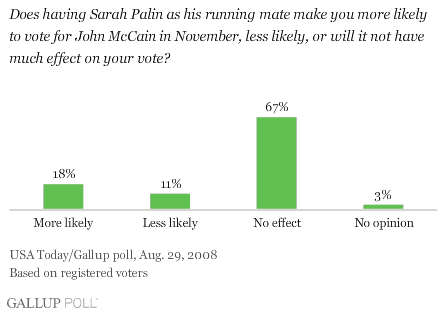
Perhaps the most significant finding about Palin in the Aug. 29 USA Today/Gallup poll is that she is largely unknown to most Americans. A substantial majority of Americans don't know enough about her yet to have an opinion, and her name identification is lower than that of any other recent vice presidential candidate when measured immediately after selection. Among those who do know her, her image is significantly more positive than negative, and her 3-to-1 positive-to-negative ratio is better than the 2-to-1 ratio measured for Biden a week ago.
A large majority say that at this point her selection will not have an impact on their presidential vote either way. However, almost as many Americans say that she is not qualified to serve as president as say she is qualified, giving her a more negative reading on this measure than most other recent vice presidential selectees, with the exception of Dan Quayle.
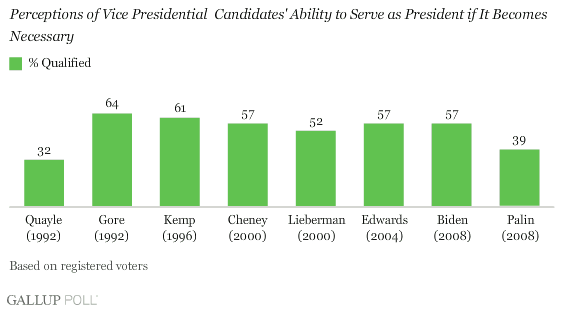
The sections that follow outline the data measured in USA Today/Gallup interviewing conducted Friday, August 29.
1. Overall Reaction to Palin's Selection Similar to Biden Selection
Americans' overall reaction to the McCain selection of Sarah Palin as his vice presidential running mate is very similar to last week's reaction to Obama's selection of Biden.
A little less than half of Americans rate the selection of Palin as excellent or pretty good, while 37% rate it as only fair or poor (the rest have no opinion). Gallup's measure of reaction to Biden's selection on August 23 was only slightly different, even though many more Americans were familiar with the Delaware senator when he was named.
In turn, the Palin and Biden assessments are well below the positive reaction the public had to John Kerry's selection of John Edwards in 2004, and slightly less positive than Al Gore's selection of Joe Lieberman and George W. Bush's selection of Dick Cheney in 2000. All recent V.P. selections are more positive compared to George H. W. Bush's selection of Quayle in 1988, the only selection to be reviewed more negatively than positively by the public.
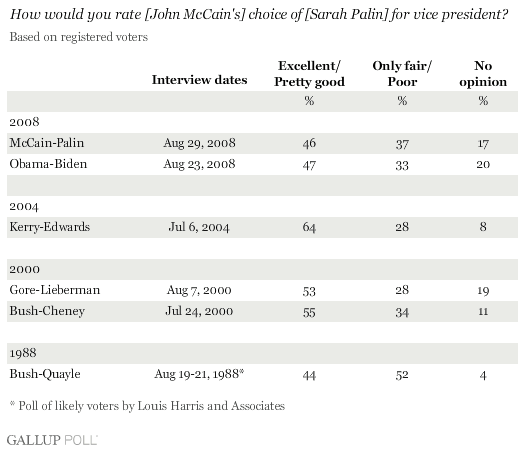
As was the case for Biden a week ago and all vice presidential selections of the last two decades, the substantial majority of Americans say that the selection of Palin will not have much impact on their vote for president this year.
Of those who do have a reaction, the impact is more positive than negative for both Palin and Biden, though the reaction to Palin's selection is the more positive of the two, by a modest margin.
These reactions to the 2008 vice presidential running mates are similar to those that greeted both 2000 vice presidential selections, but slightly less positive than other recent selections such as Edwards in 2004, Jack Kemp in 1996, Gore in 1992, and Lloyd Bentsen in 1988.
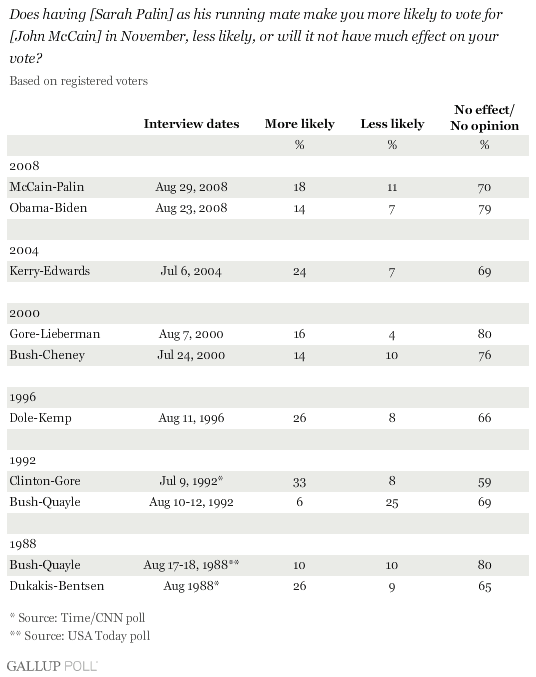
Even among Republicans, the reaction is muted. Thirty percent of Republicans say that Palin's selection makes them more likely to vote for McCain, while just 5% say they are less likely to vote for McCain, leaving the rest saying that her selection, at least so far, has no impact on their vote. Still, this is a slightly stronger partisan reaction than Democrats had to Biden, as just 21% of Democrats said they were more likely to vote for Obama because Biden was his running mate.
Among the crucial bloc of independents, the impact of Palin's selection is mixed, with the majority saying "no impact," and about as many of the rest saying that it made them less likely to want to vote for her as more likely to vote for her.
Importantly, there is no sign yet of a vehemently negative reaction from Democrats. Just 14% say they are less likely to vote for McCain as a result of the Palin selection, while 6% say they are more likely to vote for McCain.
2. Palin a Mystery to Majority of Americans
One reason for the lack of a self-reported impact of Palin's selection may be the fact that she is a mystery to many Americans at this early point. More than 7 out of 10 Americans interviewed on Friday night said they had never heard of Palin, or didn't know enough about her to have an opinion. This is a much higher "don't know" than measured by Gallup immediately after the initial vice presidential announcement of Biden a week ago, or Edwards, Lieberman, Cheney, Kemp, or Gore in previous years' elections.
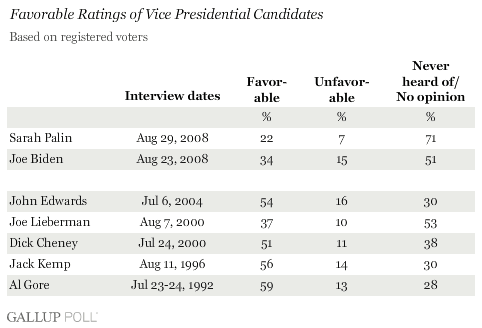
This finding is not surprising. The other vice presidential picks in recent years have actively sought their party's presidential nomination in the year they were selected or in previous years, or had well-established careers in Congress or the federal government. Palin has been governor of a small state for less than two years and has no national political experience.
Of interest is the fact that almost 6 out of 10 Republicans say they have never heard of Palin or don't know enough to have an opinion about her. These data underscore that the degree to which Palin is featured at the Republican convention in St. Paul, Minn., next week will be critical in the establishment of her overall image in the minds of many members of her own party, as well as independents and other potential swing voters.
Even at this point, however, Palin has a positive image among those who know enough to have an opinion of her, with more than a 3-to-1 ratio of favorable to unfavorable ratings, more positive than Biden's ratio measured last weekend.
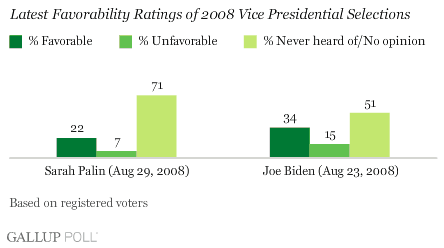
By comparison, Edwards, Lieberman, Cheney, Kemp, and Gore all had much more positive favorable-to-unfavorable ratios than either of this year's vice presidential selections. All in all, Gallup's initial reads of the recognition and image of both Biden and Palin after their selections this year are more muted than has been the case for other recent vice presidential selections.
3. Potential Problem for Palin: Perceived Qualifications to Serve as President
Palin rates substantially below other recent vice presidential selectees in terms of perceptions that she is qualified to serve as president. Asked if from what they know about Sarah Palin, they believe she is "qualified to serve as president it if becomes necessary," only 39% of Americans say yes, while almost as many, 33%, say no.
These results are highly partisan in nature -- 63% of Republicans say she is qualified, but 53% of Democrats say she is not. Independents are more likely to say she is qualified (41%) than not (31%).
Taken as a whole, the reaction of Americans to Palin's qualifications is much more negative than was given to Biden a week ago after his selection by Obama, when 57% said Biden was qualified to serve, and only 18% said he was not.
In terms of the ratio of "yes" to "no" responses, the perception of Palin's qualifications is more negative than the "qualification" affirmations given to any other recent selection with the exception of Quayle in 1992. The rating of Quayle's qualifications, however, was at a time in which he had already served for four years as vice president, and thus not directly comparable to these initial reactions to the other selectees.
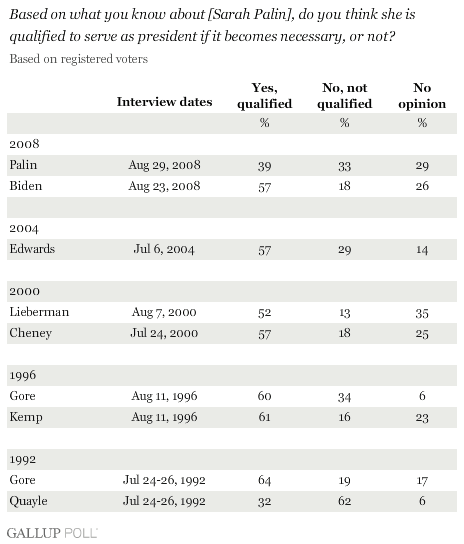
Bottom Line
The initial reaction of the American public to McCain's surprise selection of Palin as his vice presidential running mate is muted. A substantial majority of Americans don't know enough about her yet to have an opinion, and a large majority says that at this point her selection will not have an impact on their presidential vote either way.
The good news for McCain and Palin is that among those who do know her, her image is significantly more positive than negative, and in fact more positive on a ratio basis than the image of Biden when his was measured a week ago.
On the negative side of the ledger for the Republicans is that almost as many Americans say she is not qualified to serve as president as say she is qualified, giving her a more negative reading on this measure than any other recent vice presidential selection with the exception of Quayle in 1992.
Given the fact that so many Americans profess at this point to know nothing about Palin, the next several weeks may be critical to her success as a vice presidential nominee as her image is shaped and formed in the harsh spotlight of national media attention. The data suggest that one major task of the Republican convention in particular will be to convince a skeptical public that she would be able to serve as president if needed.
Survey Methods
Results are based on telephone interviews with 898 registered voters, aged 18 and older, conducted August 29, 2008. For results based on the total sample of registered voters, one can say with 95% confidence that the maximum margin of sampling error is ±3 percentage points.
Polls conducted entirely in one day, such as this one, are subject to additional error or bias not found in polls conducted over several days.
Interviews are conducted with respondents on land-line telephones (for respondents with a land-line telephone) and cellular phones (for respondents who are cell-phone only).
In addition to sampling error, question wording and practical difficulties in conducting surveys can introduce error or bias into the findings of public opinion polls.
To provide feedback or suggestions about how to improve Gallup.com, please e-mail feedback@gallup.com.
